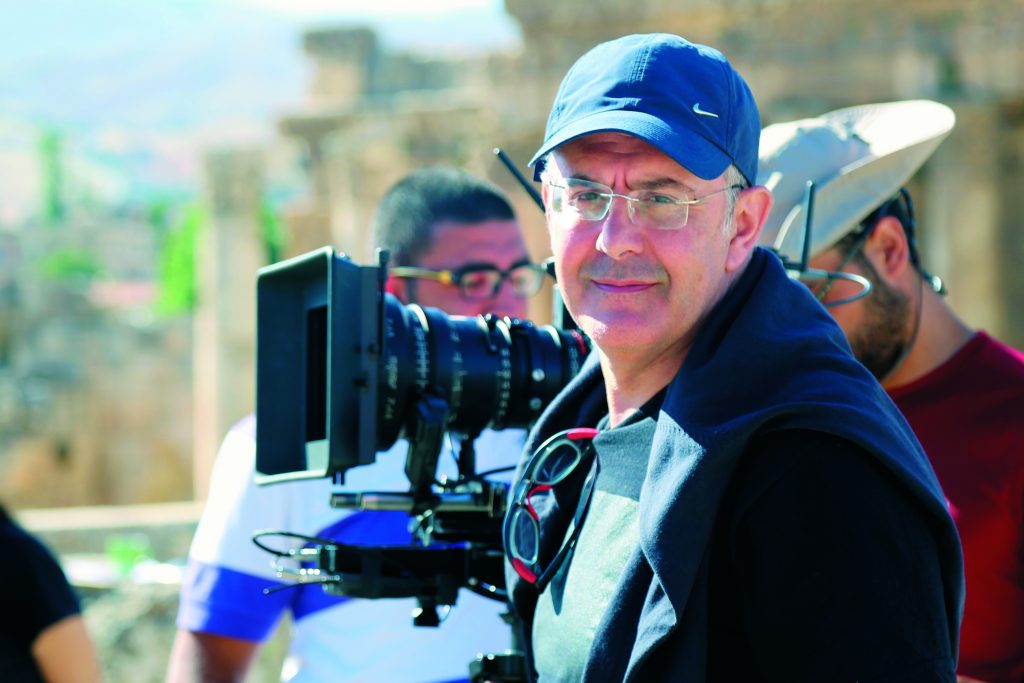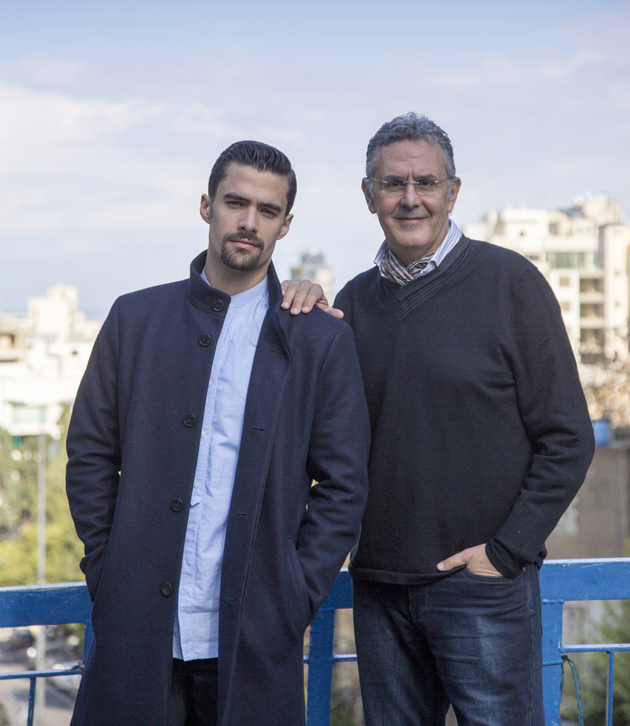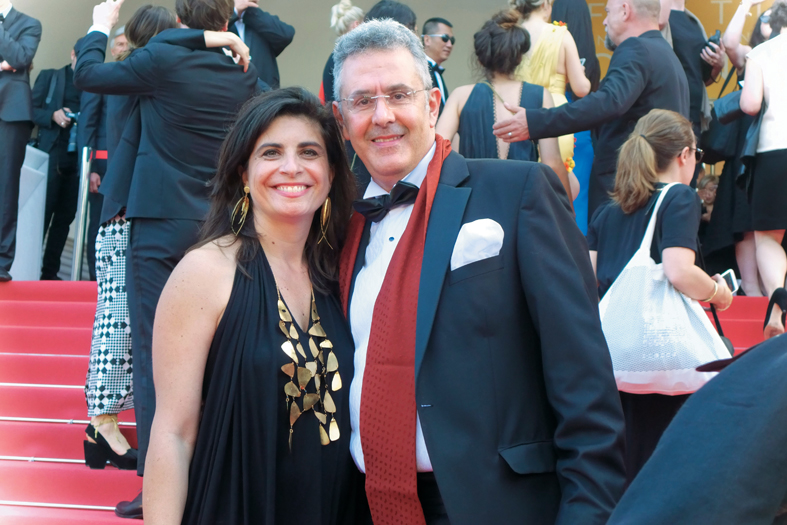Prestige issue 283, Feb. Mar. Apr. May 2017
Self-taught and perfectionist in both form and content, Franco-Lebanese producer and director Philippe Aractingi developed his talent in a country where cinema schools were non-existent. Innovative, creative and bold, constantly in search of a new cinematic style combining fiction and reality, where chaos and order are mixed together, drama to love of life to represent this region of the Middle East, he talks with Prestige about his new film «Listen», a romantic love story, which will be screened in Lebanese cinemas starting February 9. Spotlight.

«Ismaii is a love movie awaited by the Lebanese»
Your recent film «Ismaii» comes out of the stereotypes of the war and its aftereffects. What does it tell? «Ismaii» or «Listen» is above all a story of romantic love, that of a young sound engineer, Joud, discreet and introverted, who falls madly in love with a young actress, Rana, whom he seduced Introducing her to his universe of sounds. But one day, Rana disappears. Wanting to remain faithful to her, Joud tries to recover her through sounds and sound messages that he sends her thanks to the complicity of her sister. To make a film about sound, desire, the place of the man among women in Lebanon, a film about Beirut, about loyalty is, in my opinion, a form of resistance against what is happening in Lebanon and the Middle East. A film that does not speak of problems but of love is an indirect form of resistance of life, of hope, in the face of fear and death. By choosing to make a sensual film, I choose to stay on the side of the desire and the appetite to live. «Ismaii» is a modern-day story about fidelity and temptation, a sonorous journey that talks about listening. It depicts the scenery of a «modern» Beirut society in perpetual search for identity, a youth fleeing from the current problems of Lebanon and the Middle East.
Who are the actors of the film? Wanting to make a movie for young people, I have done a lot of interviews and chosen young actors, in order to try to enter their universe and tell a story that is faithful to them. I did the casting while I was writing the screenplay with Mona Korayem, which was very interesting because I wanted to get to know my actors better and write for them. The cast is composed of two new young talents, Hadi Bou Ayach and Ruba Zaarour, with the participation of Joseph Bou Nassar and his daughter Yara Bou Nassar, as well as Rafic Ali Ahmad and Lama Lawand.
What is the role of sounds and listening in the film? «Ismaii» is a film that must be listened to. A scenario that must be understood. It is a film about noise but also and especially about silence. I would like the public to listen to what Joud records, what his ears hear. Let us be lost with him in the multitude of sounds that Beirut offers him, Beirut where life is sometimes so sweet and sometimes so chaotic and crazy. Listening means empathy, openness to others. Today, listening is not present in Beirut where the city is extremely noisy. It is a film that gives more to hear than to see. It is also a love story of someone who wants to remain faithful to his sweetheart.

Philippe Aractingi With the hero of his film Ismaii, Hadi Bou Ayach.
«The movie Ismaii Unveils quite exceptional sensual scenes It makes us dream and gives us hope.»
«Ismaii» is different from your first three films that were focused on the war in Lebanon … «Ismaii» is my fourth feature film after «Bosta», «Sous les bombes» and «Héritages». Although «Bosta» was denied 18 times by the authorities of French production, since it does not speak of war (at least directly), the film was very successful in Lebanon and created new ties with the public. This musical has been very popular with the public, even though one encounters inside the comedy the aftereffects of the war. It broke all records, recorded 140,000 entries and was broadcasted in 16 countries. «Under the Bombs» is a film about the war that received 23 awards and was broadcasted in 30 countries. The third film «Inheritances» is an autobiography that traces the exiles of my own family, a film about memory and exile. Projected in 8 countries, it is currently taught in thirty institutions in Lebanon, as well as abroad. Voluntarily «Ismaii» is a film of love that comes completely from the clichés, which responds to what the Lebanese are waiting for but not to the West for whom Lebanon must undeniably tell problematic stories.
How did you come to the world of cinema? I came to the cinema with an intuitive appeal, somewhere … I wanted to testify, to tell, and through the image, I could express myself better. At 16, I photographed the war for magazines of the world, then I studied business and finally I opted for the cinema. Since there was no such school in Lebanon, I started working at the LBC where I made my first documentary at the age of 20. That was a kind of appeal. Then for sixteen years, I worked in France, doing forty documentaries on all sorts of subjects, films in Europe for foreign television such as Arte, France 2 and France 3. And at 40 years old, I realized my first Feature film, «Bosta», at a time when cinema was almost non-existent in Lebanon. Its release has made it possible to reconcile the Lebanese with the local cinema.
What is cinema in the eyes of Philippe Aractingi … Cinema is the mirror of a society. It is an in-depth look back at what a society can be. The cinema is always political or rather should be political even if it is a love story. It remains an object of resistance. With «Ismaii», I focalized on love which is a way of resisting. In Lebanon, there are very few producers who make exportable films. I will continue to fight to make films that can be seen both in Lebanon and abroad. The battle is very difficult but I had the chance to succeed until now.
Unlike soap operas, your film production is rare … I am one of those who started to make movies in Lebanon. I’m talking about the post-war period. I admit that it is hard to keep up the road. I won until now 38 prizes but I always feel every time I start a film, that I had done nothing before, because the commissions change, the production changes but we always realize quality films. And that’s what’s important. Today I say that there are many productions but it is up to the spectator to know how to choose the right one, as he chooses a good hotel or a quality restaurant to eat. I’m a screenwriter, director, producer and distributor of my film «Ismaii» which took a year and a half of work: six months of writing, four months of financing, two months of shooting and eight months of finishing. The film required 32 days of filming without counting the 22 weeks of editing and 7 weeks of sound editing.
In 1989, you left Lebanon for France. What contribution did this trip have on your career? In Lebanon, we have a lot of stories to tell and because our identity is multiple, we are a bit unstructured. In Europe, I learned structure. Today Europe has taught me not only to make documentaries, but also to write structured scripts. I am often consulted by students of Alba for their scripts. I worked well in France but I made a choice to come to Lebanon. My contribution to the Lebanese cinema has much more weight than the one I had in France in international cinema. I made films that were seen by five million unknown people, while the Lebanese public, much less numerous, reacts more tangibly to my films. In 2001, I returned to Lebanon and founded Fantascope Production, a content-oriented company specializing in the production of documentaries in all formats. In 2006, the war broke out in Lebanon, I went back to France and I shot «Sous les bombes» which was selected at the festivals of Venice, Sundance and Dubai and collected 23 prizes. But it was only by realizing «Inheritances» in 2014, that I made the choice to return to Lebanon.

What about your passion for photography? Actually I am a photographer. I am an amateur of photos of all kinds, I already made an exhibition on «Night on Beirut» in Paris, and I prepare another on the water and my city …
Out of the many awards you have received, which is the dearest to your heart? I have a very good memory of La Mostra in Venice, where I received three awards for the film «Sous les bombes». It was impressive to see a hall of eight hundred people who made a standing ovation ten minutes without stopping. There was much love there. I also keep another good memory of my first prize that I received for my film made at 26 years old in which I was telling my experience in paragliding, a sport that was still unknown in Lebanon. It was featured in «Envoyé Spécial» and got the first prize at the festival of the flight of Icarus. I confess that out of the 38 awards I have received so far, I did not expect any. Still today I work for the pleasure of making movies but without waiting for results.

What about the Future of Lebanese Cinema and Talents? Today, Lebanese cinema exists. We are much more present. We are on a positive, growing path but Lebanese cinema will always be reduced to individual experiences that have difficulty traveling as long as the state does not help the sector. We produce in Lebanon between three and four international films and a dozen films in total, while other countries in the region are present in all film festivals, offering a wide range of films. The operation remains difficult, even artisanal, although today we are much more present through the Foundation Lebanon Cinema (FLC) of which I am a founding member and also vice-chairman of the committee of Screen Institute Beirut.
Are there new projects in preparation? The Lebanese public is a bit skeptical about Lebanese cinema. I advise him to go see «Ismaii» especially in movie theatres, because it is a film about sound, where listening is important. I encourage him to go see the film as soon as possible especially as the projection in Lebanon does not last long. For my part, I continue to write and look for people who want to contribute to the production. I am currently working on two stories, besides the corporate films that I realize for different companies. More recently, I began to like making publicity films. Interview Conducted by Mireille Bridi Bouabjian








